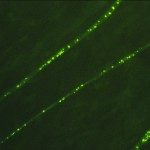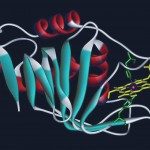Link to Pubmed [PMID] – 31346033
J. Biol. Chem. 2019 Sep;294(37):13755-13768
Protection of neuronal homeostasis is a major goal in the management of neurodegenerative diseases. Microtubule-associated Ser/Thr kinase 2 (MAST2) inhibits neurite outgrowth, and its inhibition therefore represents a potential therapeutic strategy. We previously reported that a viral protein (G-protein from rabies virus) capable of interfering with protein-protein interactions between the PDZ domain of MAST2 and the C-terminal moieties of its cellular partners counteracts MAST2-mediated suppression of neurite outgrowth. Here, we designed peptides derived from the native viral protein to increase the affinity of these peptides for the MAST2-PDZ domain. Our strategy involved modifying the length and flexibility of the noninteracting sequence linking the two subsites anchoring the peptide to the PDZ domain. Three peptides, Neurovita1 (NV1), NV2, and NV3, were selected, and we found that they all had increased affinities for the MAST2-PDZ domain, with values decreasing from 1300 to 60 nm, while target selectivity was maintained. A parallel biological assay evaluating neurite extension and branching in cell cultures revealed that the NV peptides gradually improved neural activity, with the efficacies of these peptides for stimulating neurite outgrowth mirroring their affinities for MAST2-PDZ. We also show that NVs can be delivered into the cytoplasm of neurons as a gene or peptide. In summary, our findings indicate that virus-derived peptides targeted to MAST2-PDZ stimulate neurite outgrowth in several neuron types, opening up promising avenues for potentially using NVs in the management of neurodegenerative diseases.







